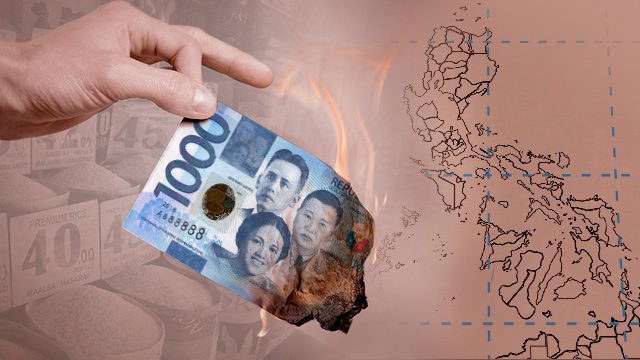SUMMARY
This is AI generated summarization, which may have errors. For context, always refer to the full article.

MANILA, Philippines (UPDATED) – Venezuela is a country of millionaires, but it’s not what you think.
To afford a carton of eggs in Venezuela, you need 3 million bolivars. One dollar is equivalent to over 119,000 bolivars. The currency is basically worthless.
According to the leading universities there, 87% of the population is poor. Millionaires are the new poor in the Latin American country.
Venezuela is suffering from hyperinflation or skyrocketing prices of goods and the depreciation of its currency. The country’s opposition-majority parliament said hyperinflation in Venezuela was at a staggering 25,000%, which means the price of an item now costs 250 times what it did a year ago.
According to Filipino economists, a similar scenario could also happen to the Philippines if the government insists on shifting to federalism. (READ: June 2018 inflation soars to 5.2%)
University of Asia and the Pacific (UA&P) professor Victor Abola said the Philippines could suffer the same fate as Latin American countries like Mexico and Brazil which are both federal states.
He said the two countries had a hard time controlling the spending of local states due to politics during the late ’80s up to the mid-’90s.
“So even if the federal government makes an agreement with IMF (International Monetary Fund) for fiscal austerity, the states will continue spending ’til thy kingdom come because of elections, and that’s the primary reason for their hyperinflation episodes… which exceeded 4,000% inflation,” Abola said.
He also cautioned government that federalism coupled with political dynasties could lead to a state run by “warlords.” (WATCH: Rappler Talk: Is the Philippines ready for federalism?)
As Bernardo Villegas, another economics professor at UA&P, puts it: “It’s going to be a disaster.”
Villegas warned there would be a “big gap” in the ability of federal states to implement all projects and spend funds. (READ: [OPINION] The bad economics of Duterte’s draft constitution)
“The local government is poor in managing. Our national government is getting more professional, but they (the local government units) are not. The local level is not very transparent in using funds. They do not know how to spend the money,” he said.
Villegas also slammed the proponents of federalism for the “completely arbitrary” way of clumping together provinces for federal states.
“Imagine the duplication of all expenses of all levels,” he added.
Should the government insist on restructuring the provinces or modifying how regions get funds, Villegas said the Local Government Code already provides the necessary mechanisms.
A survey by Pulse Asia showed that majority of Filipinos reject the shift to a federal form of government.
The same survey found that only two out of 10 Filipinos agree that the 1987 Constitution should be amended at this time. – Rappler.com
Add a comment
How does this make you feel?
There are no comments yet. Add your comment to start the conversation.